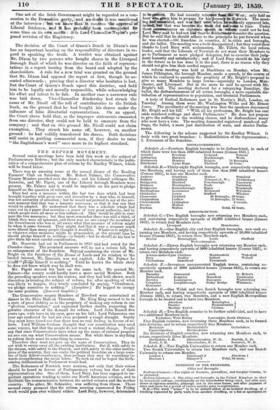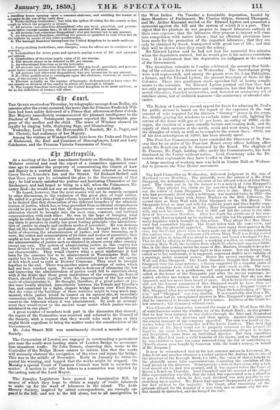THE REFORM MOVEMENT.
Several union meetings have been held this week on the subject of Parliamentary Reform ; but the only marked characteristic is the publi- cation of a comprehensive plan of reform by Sir Eardley Wilmot, which will be found below.
There was an amusing scone at the annual dinner of the Reading Farmers' Club on Saturday. Mr. Robert Palmer, the Conservative County Member presided over the feast ; and his Liberal colleague Mr. Bouverie, and Mr. Pigott, one of the Liberal borough Members were present. Mr. Palmer said it would be impolitic on his part to pledge himself on the question of reform.
They had seen a measure within the last two days which had been brought together with great care and invention by a man who, in himself, was not unworthy of attention ; but he would not pretend to say at the pre- sent moment that that was a measure necessary, or that it was one that would be adopted. He understood that there was a schedule which had come out in a paper that morning—a paper of very great authority, and by which people were all more or less influenced. They would be able to com- pare the two measures ; but they must remember there was still a third, of which they were all ignorant, and there was no one except the members of the Government who was at all aware what that measure of reform might be when it came forward. They might find that it was a measure much more liberal than many people thought it would be. Whatever it might-be,' or whatever other measures might be propounded, at the present time he should pledge himself to nothing —(a laugh)—but he shou1:I-V-0 his best to give them his most careful consideration.
Mr. Bouverie had sat in Parliament in 1832 mid had voted -for the Chandos clause. The promised measure will be not a reform bill, but an enlargement of the franchise. Bernd combating the views of Mr. Bright on the functions of the Rouse of Lords and its relation to the landed interest..M4-rMaverie was not explicit. Like Mr. Palmer he Tv-aid-41 gerge himself to nothing." Until he knows the whole story he does not know which way he shall vote. Mr. Pigott steered his bark on the same tack. He praised Mr. Palmer—the county could hardly have a more useful Member. Both the preceding speakers were his seniors, and they had both shown much discretion in treating the subject of reform, for, after speaking of what was likely to happen, they wisely concluded by saying, "Gentlemen, we pledge ourselves to nothing." (Laughter.) He begged to occupy the same position. (Renewed laughter.) The Conservative county Members of Hereford were entertained at dinner in the Shire Hall on Thursday. Mr. King King seemed to be in _ a state of great dubiety as to the propriety of making any reform in our "glorious constitution," and expressed further doubts respecting the genuine character of the demand for reform. Lord John Russell five years ago, with tears in his eyes, gave up his bill ; Lord Palmerston one year ago confessed he had not even prepared a rough draught. Surely they must have found out that there was no real feeling in favour of re- form. Lord William Graham thought that our constitution may need some repairs, but that the people do not want a violent change. People say that since Conservatives have taken up the cause of rational progress no one can say what Conservatism means. But while there is anything to reform there must be something to conserve. Therefore they must not give up the name of Conservatives. They do not wish to sweep away all the existing institutions. But if, with safety to the throne, with safety to the Church, and with safety to the other instate- tions of the country, they can confer the political franchise on a large num- ber of their fellow-countrymen, then perhaps they may do something to- wards strengthening the social fabric. To such an end he hoped the forth- coming deliberations in Parliament would lead.
The Reformers of Norwich were anxious, not only that their voices should be heard in favour of Parliamentary reform, but that of their representatives also. One of them, Lord Bury, has been engaged in im- portant operations tending to unite our North American colonies, and to facilitate the communication between the united colonies and the mother country. The qther, Mr. Schneider, was suffering from illness. There seemed every prospect that the reform meeting summoned for Friday week would pass over without either. Lord Bury, however, determined to be present. He had recently returned free the West ; only half an hour was given hint to prepare for his journey te Norwich. The meet- ing had assembled, and was half over when he suddenly appeared late, indeed, but that was because the train did not come to time. Under these circumstances an elaborate speech on reform could not be had. Lord Bury said he had not had time to deliberately consider the question. But he said that he should adhere to the principles he put forward when he was elected-101. franchise in counties, 51. in cities and boroughs, and lite ballot. The meeting was a leetk disappointed ; but they voted their thanks to Lord Bury with acclamation. Mr. Tilled, the local reform leader, said that the Liberals of Norwich do not want their Members to go to Parliament as mere pledged delegates, but to exercise their judg- ment honestly and satisfactorily; and if Lord Bury should do his duty in the future as he has done it in the past, there is no reason why they should not give him their cordial support.
A reform meeting was held at Blackburn on Monday, when Mr. James Pilkington, the borough Member, made a speech, in the course of which he ventured to question the propriety of Mr. Bright's proposal to give so many Members to large towns—especially to London, Man- chester, and Liverpool. But in the main he said he agreed with Mr. Bright's bill. The meeting declared for a ratepaying franchise, the ballot, the disfranchisement of all rotten boroughs, a more equitable dis- tribution of representatives to population, and triennial Parliaments.
A body of Radical Reformers met in St. Martin's Hall, London on Tuesday. Among them were Mr. Washington Wilks and Mr. Ernest Jones. The peculiarity of the meeting was that the speakers denounced Mr. Bright and his bill. "With all his professions, Mr. Bright has cast aside manhood suffrage and short Parliaments." He does not propose to give the suffrage to the working classes, and he disfranchises many who now have a vote. The meeting demanded registered manhood suf- frage, the ballot, a more just distribution of seats, and shorter Parlia- ments.
The following is the scheme suggested by Sir Eardley Wilinot. It deals with two great branches : 1. Redistribution of the representation; 2. Extension of the franchise.
DISFRANCHISEMENT.
Schedule A.—Fourteen English boroughs to be disfranchised, in each of which there were less than 1000 inhabited houses (Census 1851.)
Arundel Evesham Liskeard Totness Ashburton Harwich Marlborough Wells Dartmouth Honiton Reigate 14 Boroughs Dorchester Lyme Regis Thetford 22 Seats.
Schedule B.—Thirty-eight English boroughs, now respectively returning two Members, and having each of them less than 2000 inhabited houses (Census 1851), to lose one Member each.
EXTENSION OF THE FRANCHISE. Cities and Boroughs.
Disfranchisement. —The rights of freemen, potwallers, and burgage tenants, to be abolished.
B»franchisement.-1. The cities and boroughs in the United Kingdom to elect by household suffrage, conditionally on the householder being rated, and after resi- dence of eighteen months, although not in the same house, and after payment of rates and taxes for a period of twelve months prior to registration. N.D.—The word " house " is to be defined either as an isolated dwelling, or a dwelling separated by party walls from another dwelling, or a fiat or apartment in
Bodmin Guildford Newport (1. W.) Tewkesbuty Bridgnorth Hertford Peterborough Tamworth Bridport Huntingdon Poole Tavistock Bridgwater Knaresborough Ripon Weymouth Buckingham Leominster Richmond Wycombe Chichester Lewes Stafford Windsor Cirencester Lichfield 38 Boroughs, 38 Seats.
Chippenham Cockermouth Ludlow Lymington 14 Boroughs, 22 Seats.
4 vacant.
Devizes Malden
_ Durham Melton Total, 64 Seats.
REDISTRIBUTION.
Schedule C.—Two English boroughs now returning two Members each and containing respectively upwards of 50,000 inhabited houses (Census 1851), to return Joni Members each.
_ .... - - Liverpool Manchester. Schedule .D.—One English city and four English boroughs, now each re- turning two Members, and having respectively upwards of 20,000 inhabited houses (Census 1851), to return three Members each. Bristol Birmingham Leeds Sheffield
Wolverhampton.
-
Schedule R.—Eleven English boroughs now returning one Member each, and having respectively upwards of 3000 inhabited houses (Census 1851), to return two Members each.
Ashton-under-Lyne Chatham Huddersfield Wakefield Bury Dudley Salford Walsall Cheltenham Gateshead Tynemouth
Schedule F.—Seventeen unrepresented English towns, containing re- spectively upwards of 2000 inhabited houses (Census 1851), to return one Member each.
Barnsley Gravesend Louth St. Helen's
Birkenhead Keighley Mansfield Troubridge Burnley Leamington Ramsgate Wednesbury Congleton Loughborough Staley Bridge Wisbeach. Doncaster
Schedule G.—One Welsh and two Scotch boroughs now returning one Member each, and having respectively upwards of 5000 inhabited houses (Census 1851), to return two Members, and a new English Metropolitan borough to be created and to have two Members.
Dundee Kensington 1 Aberdeen ffton Merthyr Tydvil Chelsea.
Schedule H.—Two English counties to be further subdivided, and to have two additional Members each.
Yorkahire, West Riding Lancashire, South Division.
Five English counties, now returning three Members each, to be formed into divisions, and to return respectively four Members.
Berkshire Herefordshire Oxfordshire.
Cambridgeshire Hertfordshire
Six divisions of English counties, now returning two Members each, to return respectively three Members.
Derbyshire, S. 1). Glouce.stershire, W. D. Norfolk. E. D. Essex, S. D. Lincolnshire, N. D. Somerset, W. D.
Schedule K.—Two English Universities to return one Member each.
Two Scotch Universities to return two Members each, and one Scotch University to return one Member.
London 1 Edinburgh 2 Aberdeen 1
Durham 1 Glasgow 2 Total, 64 seats. • Andover Grantham Marlow Stamford occupier to the use of the outer door. 2. Forty-shilling freeholders ; but with the option of voting for the county or bo- rough in which the property is situate.
3. All persons (not otherwise disqualified) who pay local, parochial, and govern- ment taxes (except income tax), in all to the amount of 50s. per annum. 4. All persons (not otherwise disqualified) who pay income tax to any amount. S. An educational franchise, entitling the person so qualified to vote when not on the register by means of any other qualification. 6. The borough franchise throughout the United Kingdom to be made uniform.
Counties.
1. Forty-shilling freeholders, rent charges ; votes for offices are to continue as at present. 2. Leaseholders for seven years and upwards paying a rent of 10/. and upwards per annum. 3. Copyholders of the clear yearly value of 21. per annum.
4. The tenant clause to be reduced to 25/. per annum.
5. An educational franchise as in the boroughs.
6. All persons (not otherwise disqualified) who pay local, parochial, and govern- ment taxes (except income tax) to the amount of Ma. per annum.
7. AU persons (not otherwise disqualified) who pay income tax to any amount. N.B.—This qualification is contingent upon the abolition, renewal, or modifica- tion, of the income tax in 1860.
8. Electors actually on the register of boroughs disfranchised to have votes for the county or division of the county in which the borough is situate. 9. The county franchise throughout the United Kingdom to be made uniform, as far as the difference of tenures will allow.



























 Previous page
Previous page